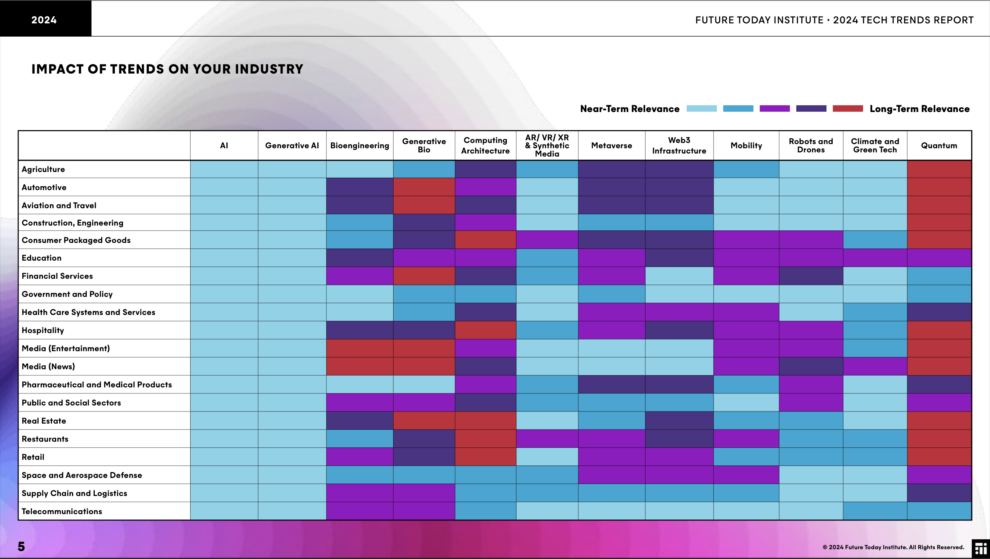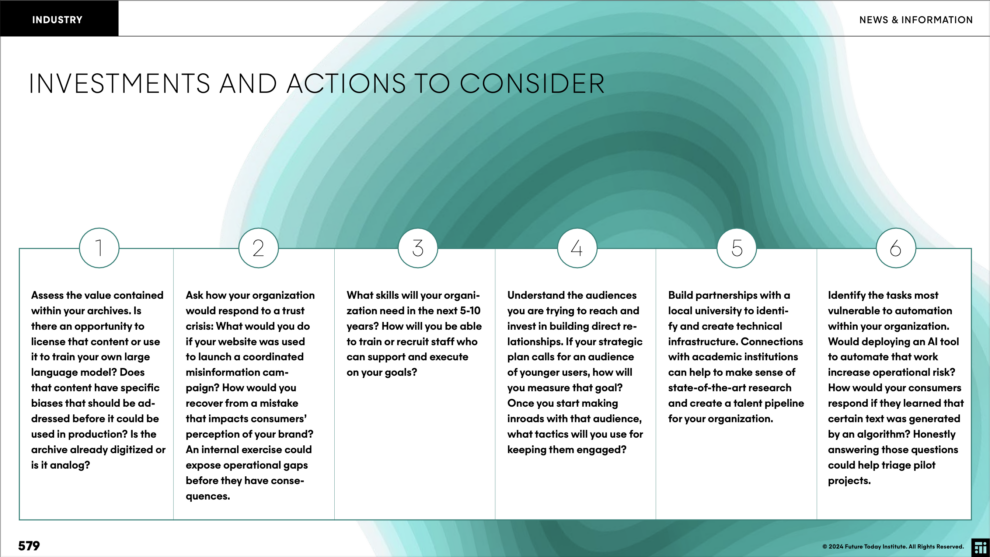For the 17th consecutive year, the Future Today Institute has unveiled its 2024 Tech Trends Report, a comprehensive analysis spotlighting the technological shifts shaping industries from agriculture to aviation and notably, news media.
This year’s 900-page edition highlights a pivotal moment: a technological supercycle revolutionizing how we interact with information, trust, and each other. Particularly in the news industry, this era of rapid advancement raises critical challenges.
This article explores the media industry’s navigation of these turbulent waters and offers insights and strategies also applicable to other sectors dealing with similar technological transformations.

The Media as a Barometer for Public Trust
In an era marked by rapid technological advancements, it is no surprise that AI has emerged as one of the leading disruptors in the news industry. Technologies like Generative AI, XR, and Synthetic Media stand at the forefront of this transformation. The Future Today Institute’s 2024 Tech Trends Report sheds light on this evolution, highlighting the media’s critical role in the fabric of society.
The 2023 Reuters Institute Digital News Report highlights a concerning trend: only 40 percent of people “trust most news most of the time”. AI can manufacture convincing yet completely fabricated information, presenting a threat to public trust. This erosion of trust doesn’t just alter news consumption habits. It undermines societal cohesion and the essence of democratic discourse. With AI generating misinformation, the foundational shared set of facts necessary for communal and national dialogue begins to dissolve.
This trust deficit has profound ramifications, impacting businesses, governments and individuals. The degree of trust placed in news organizations is often reflective of broader societal trust in institutions. A decline in media trust, therefore, signals a broader crisis of confidence in societal pillars.

Generative AI raises existential questions for the media, challenging the industry’s ability to maintain credibility. A case in point is CNET’s experience with AI-generated articles, where the lack of oversight led to errors and accusations of plagiarism. This incident serves as a concrete example of the challenges to public trust, highlighting the critical need for robust editorial policies in the use of AI in journalism.
Moreover, the perceived polarization of news sources further erodes our capacity for civic debate. It’s increasingly challenging to engage in substantive policy conversations without a shared set of facts, exacerbating the partisan divides within our society.
Is this story capturing your attention?
"(Required)" indicates required fields
News Companies are Leading AI Fact-Checking
News organizations have been at the forefront of developing strategies to combat AI-generated misinformation. Initiatives like the Content Authenticity Initiative, spearheaded by Adobe and supported by major news outlets like The New York Times, Axel Springer, and the Associated Press, are making strides towards enhancing content authenticity and fighting misinformation.
These methodologies developed for verifying news content are increasingly relevant across industries, serving as a model for how businesses, educational institutions, and other organizations can approach fact-checking and information verification.
In a similar vein, journalists are not only ensuring the factualness of content, but can also help keep AI companies transparent. Indeed, the report highlights journalists’ critical role in scrutinizing AI companies, emphasizing the technology’s uses, biases, and ethical implications. That said, this level of scrutiny is only possible if journalists possess a deep understanding of how AI technology functions. As such, the FTI’s Tech Trend report suggests that “hiring managers in newsrooms should be open to candidates with unconventional paths but strong technical skills.
News Consumption as an Indicator for Shifting Search Behaviours
The advent of AI has revolutionized how individuals seek and access information, fundamentally altering the landscape of search and discovery. Backed by AI, search engines offer unprecedented convenience. This technological shift, changes in user news behavior, and social media platform algorithms have precipitated a notable decline in organic traffic to news websites.
The disruption by AI-powered search technologies, particularly by giants like Microsoft and Google, exemplifies the profound financial and strategic implications for the search ecosystem and the role media plays within society. As these companies forge ahead in developing sophisticated AI-driven search interfaces, they attempt to sustain their revenue models. This scenario underscores the need for media organizations to reevaluate their strategies in an AI-dominated search environment, ensuring they remain relevant and accessible to their audiences.
The media industry faces challenges and opportunities as AI continues shaping consumer behaviors and expectations. Embracing these technological advancements while upholding ethical standards and inclusivity will be key to navigating the future of information search and discovery. The role of media in this new landscape is to adapt and lead in ensuring that the digital transformation maintains access to credible and diverse sources of information.

Key Takeaways: Navigating the Future with AI and Technology
Building Trust and Ethical Standards
- AI and Public Trust: The challenge of maintaining public trust amid AI-generated misinformation extends across sectors, affecting consumer engagement, government communication, and community connection.
- Ethical AI Deployment: Addressing potential biases and ensuring equitable benefits from AI technologies are universal needs. Ethical considerations in deploying AI are crucial across industries to avoid amplifying inequalities.
Adapting to Technological Changes
- Navigating Technological Disruptions: Insights from the media’s adaptation to AI and digital trends are invaluable for other sectors experiencing similar transformations. Innovation, coupled with ethical standards, is key to success.
- AI’s Role in Information Discovery: The AI-driven evolution in search and discovery necessitates adjustments in digital strategies across all industries to stay relevant and competitive.
Ensuring Sustainability and Security
- Philanthropy and Sustainability in Local News: The dependency on philanthropy for local news underscores the need for diversified revenue streams in all sectors to ensure long-term sustainability and independence.
- Journalist Security and Democratic Resilience: The imperative to protect professionals from digital and physical threats is a shared responsibility, underlining the broader importance of security measures in the digital age.
Managing Digital Content and Legislation
- Digital Preservation and Access: The shared challenge of preserving digital content across industries emphasizes the need for robust data strategies and preservation tactics.
- Regulatory and Legislative Dynamics: Experiences from media regulation offer a roadmap for balancing free speech, innovation, and public safety within complex regulatory environments across various sectors.
Did you find this story interesting?
"(Required)" indicates required fields
Other Blog Posts

Stay on top of the game
Join our community of industry leaders. Get insights, best practices, case studies, and access to our events.
"(Required)" indicates required fields

